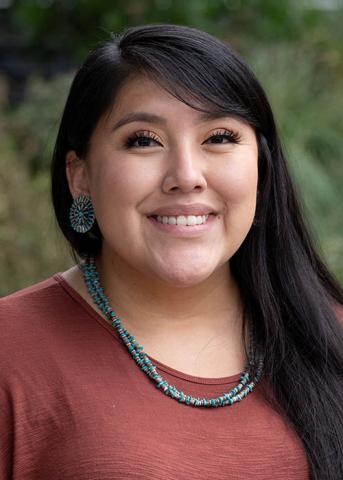What interested you in studying public health and why are you passionate about it?
A combination of both education and professional experiences exalts why public health is so important to me and my future aspirations. I graduated from the University of New Mexico with my bachelor's degree in community health and then worked in a variety of settings, including clinical and community outreach on diabetes prevention and commercial tobacco prevention and control. I primarily worked with the southwest tribes in New Mexico, which included the 19 Pueblos, Navajo Nation and Apache tribes.
On a personal note, I was raised to take care of others including my family, community and elders. I think as Native students the desire to obtain higher education degree is often for our community. Studying public health ensures that I am contributing to the change that is needed and contributing to innovations and opportunities for the sake of Native people.
What’s your favorite aspect about studying public health and why?
My favorite part about studying public health is engaging with a diverse group of people and learning from various experts in the field. These conversations are usually centered around why populations are disproportionately impacted by health disparities and unjust health policies. I think it is important to discuss and analyze the inequitable systems and barriers perpetuated on Black, Indigenous, and People of Color (BIPOC) communities which influence unfavorable health outcomes and quality of life.
How do you want to change the world with your degree?
I want to change the world with my degree by educating, informing and changing the narrative about data surrounding American Indian/Alaska Native populations. Naturally, we are trained as public health practitioners to present the problem, identify resources and at least try to resolve the issue. Our starting point is often, “this many people suffer from x, y and z.” Instead, I want to change the narrative to read, “The following strengths exist in this community.”
The tribal communities we work with typically already have the answer to whatever issue is at hand, and how we can support is by providing resources and professionals with the relevant lived experiences to assist. Historically, there have been too many instances where non-Native researchers enter a community, pick and probe for their data, generate a report that is not inclusive of the community’s current knowledge and expertise, and later publish a report that isn’t always authentic to the community but might receive high recognition or an award. This is what I want to change: to elevate voices of the youth and knowledge from the elders to collectively work towards systems level changes that improve well-being of the community.
What experiences at the UW SPH have been most influential?
Being a part of the UW SPH Dean’s Advisory Council for Students has been the most influential experience for me. Now that we are back in-person, I have met some incredible like-minded students with similar goals who also resonate with the decision to pursue higher education. In this space, I can engage with students with an abundance of experience and diverse backgrounds as well as network with some influential professionals at the School. I truly feel like this cohort and staff care about my dreams and ambitions as a first-generation Native graduate student.
Why did you choose the UW?
I chose the University of Washington for a variety of reasons, but ultimately to have a seat at the table of influence. Before leaving home, I had an important conversation with two powerful women in my life: my grandma and my mom. Moving away from the reservation was a huge life transition and it meant leaving both my family and community behind. My family knew I was reluctant to move to a completely new environment, but instead of questioning why I was leaving, they reminded me of the strength instilled within me from growing up in a strong matriarchal home. Although leaving home was the biggest decision I have made, it emphasizes my commitment to the goals and vision I have for returning someday to work with and support my people. I am always reminded by family that this time away is a short sacrifice we — as Native scholars — must make to ensure the sustainability and protection of our community.
What interests do you have outside of (or related to) public health? Any extracurricular activities?
I like to spend my free time with family and friends. I enjoy a great cup of coffee, exhilarating discussions with others, and taking the time to appreciate the outdoors. My family has livestock back home where you can usually find us working with the horses, dogs, chickens, etc. I also enjoy playing basketball, entering spontaneous 5K events, and practicing my beading skills.
What is one piece of advice that you have for potential new public health students or one thing you wish you knew before beginning your public health studies?
For incoming graduate students, I recommend writing a letter to yourself at the beginning that explains why you chose your degree program and what it means to you. During graduate school, your time will be stretched thin, and this letter will serve as a reminder of your original mission. In the end, it will all be worth it.

